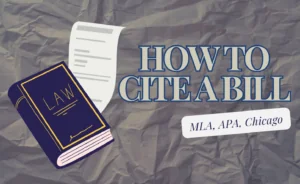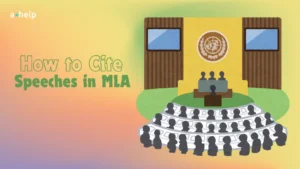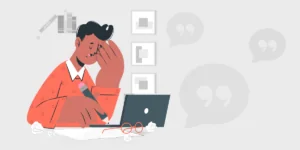Let’s be clear – accurately citing sources plays an important role, and not just for attributing credit but also allowing readers to locate the original sources. In the guide below we will discuss the specifics of citing songs in Modern Language Association (MLA) format, since it’s a common citation style used in the humanities. Citing songs (just like citing a podcast), with their unique blend of lyrics, melodies, and performances, requires attention to detail to capture both the artistry and the information needed for scholarly analysis.

✅ AI Essay Writer ✅ AI Detector ✅ Plagchecker ✅ Paraphraser
✅ Summarizer ✅ Citation Generator
Citing sources in MLA format assures consistency and clarity in academic writing. Songs and music, as cultural artifacts, provide insights into societal norms, historical contexts, and artistic expression, so many students tend to use them in academic writing.
Key Elements of a Song for Proper Citing in MLA
To cite songs in MLA format you need several components that make the citation accurate. These elements help readers locate the original sources and provide a clear context of how the song was accessed or published. Below, we provide the must-have elements required for correctly citing songs in MLA:
| 🎤 Performer 🎼 Composer | The first element in a song citation is the name of the performer or the composer of the song. This detail acknowledges the creator’s intellectual property and provides a starting point for the citation. The format typically follows the structure of the last name, first name. |
| 📝 Song Title | The song title should be placed in quotation marks to differentiate it from the titles of larger works like albums or collections, which are italicized. This distinction is important for clearly identifying the specific work being cited. |
| 💿 Album Title | If the song is part of an album, the album title should be included and italicized. This provides additional context for the song, situating it within a broader work or collection. |
| 🏭 Publisher | The entity that released the album or song is also a key component of the citation. This could be a record label or a distribution company. |
| 📅 Release Year | The year the song or album was released is necessary for context and especially to differentiate works with similar titles or from the same artist at different times in their career. |
| 🎶 Medium of Publication | Indicating the medium—whether CD, vinyl, digital format, or streaming service—is necessary for understanding how the work was accessed. This detail is particularly relevant for digital and online sources, where content might vary across platforms. |
| 🔗 URL (for online sources) | For songs accessed through online streaming services or websites, including the direct URL is required. For digital formats, the date of access is also recommended, as online content can change over time. |
| ✨ Optional Details | Depending on the focus of the research or the relevance of specific aspects of the song, additional details may be included. These could be the names of additional contributors (such as lyricists or producers), the track number, or a specific version of the song. |
How to Cite a Song in MLA
Don’t jump right into citing! First, it’s important to grasp the main idea of MLA citation practices for music sources. Whether you’re referencing a classic vinyl track, a digital download, or a streamed piece, the goal remains consistent: to acknowledge the original creators and enable your audience to find the source material. You could also use an MLA format generator to make things easier.
How to Cite a Song in Physical Formats
For songs accessed in physical formats like CDs or vinyl records, the citation should include the performer’s last and first name, song title, album name, distributor, year of release, and format. An in-text citation is traditional for MLA. Look at the example below:

How to Cite a Music Album in MLA
Citing an entire album in MLA format differs from citing a single song primarily in the scope of the citation and the details included. While both citations share some common elements, citing an entire album involves referencing the work as a whole rather than focusing on an individual track.
If you want to reference an LP, it involves citing the work as a collective piece rather than an individual part of it. Here, the album itself is the primary focus, and the citation generally includes the artist’s name, the album title in italics, the publisher or record label, the publication year, and the format. Individual song titles are not included in this type of citation since the reference is to the album as a whole. Look at the example below:

Understanding the differences between citing a specific song and entire album will help you document musical sources in academic writing, so that readers can locate the referenced material and appreciate your research and analysis. Refer to the table below to learn them:
| Focus | Single song citations highlight a particular track, while album citations refer to the entire body of work. |
| Title Formatting | In a song citation, the song title appears in quotation marks, and the album title (if included) is italicized. In an album citation, the album title is italicized without the need to mention individual song titles. |
| Details Included | Single song citations may include specific details relevant to the song, such as track number or a URL to the song itself if it was accessed online. Album citations, however, are broader and do not delve into specifics about individual tracks. |
| Purpose | The choice between citing a single song or an entire album depends on the relevance to your work. If discussing a specific track and its impact or lyrics, citing that song directly is most appropriate. When referring to the overall themes, style, or impact of an album, it’s better to cite the album as a whole. |
How to Cite Music Lyrics in MLA
Citing music lyrics in MLA format involves similar principles to citing other types of sources, with adjustments to accommodate the specific nature of musical works. When citing lyrics from a song, you’ll need to reference the songwriter, the title of the song, the album (if applicable), the recording artist (if different from the songwriter), the publisher, and the year of publication. If you accessed the lyrics online, you should also include the URL.
Here’s a step-by-step guide on how to cite the song “That Girl” by Jennifer Nettles in MLA format, assuming you’re citing the lyrics as they appear in the album of the same name.
Reference List Entry

- Nettles, Jennifer is the songwriter and performer.
- “That Girl” is the song title.
- That Girl is the album name, italicized to differentiate it from the song title.
- Mercury Nashville is the record label.
- 2014 is the year of the album’s release.
In-Text Citation
If you quote the lyrics directly, MLA format requires you to provide an in-text citation. This citation should include the songwriter’s last name and the page number (if available) or, for audio recordings, a track number or a timestamp. Since lyrics do not have page numbers and track numbers might not always be relevant or available, you could cite the song title if needed.
| Example without a specific timestamp or track number | (Lyrics from “That Girl” reflect…) |
| Example with a specific part of the song | In “That Girl,” Nettles sings, “And I don’t wanna be that girl…” (Nettles). |
Citing Online Lyrics
If you accessed the lyrics online, the citation format would slightly change to accommodate the URL. Assuming the lyrics were found on a website like Genius Lyrics or AZ Lyrics, you would format it as follows:
Nettles, Jennifer. “That Girl.” Genius, 2014, [URL]
- Replace [URL] with the actual URL where you found the lyrics.
- It’s not necessary to include the access date unless the page is likely to change over time.
In-Text Citation for Online Lyrics:
The in-text citation for online lyrics would remain similar to the example provided above, as the focus is on directing the reader to the full citation in your works cited list.
In “That Girl,” Nettles expresses the complex emotions of… (Nettles).
When citing music lyrics, always ensure that your in-text citations correspond clearly to an entry in your works cited list, allowing readers to locate the source of your quotation or reference easily.
Conclusion
Citing songs in MLA format requires attention to detail, from the performer’s name to the medium of access. The key elements of citation and common pitfalls help researchers and students respect copyright laws and academic standards in their work. Proper citation not only acknowledges the creators’ contributions but also makes the academic discourse more interesting by providing reliable and verifiable sources for further exploration.
FAQ
Follow us on Reddit for more insights and updates.





Comments (0)
Welcome to A*Help comments!
We’re all about debate and discussion at A*Help.
We value the diverse opinions of users, so you may find points of view that you don’t agree with. And that’s cool. However, there are certain things we’re not OK with: attempts to manipulate our data in any way, for example, or the posting of discriminative, offensive, hateful, or disparaging material.